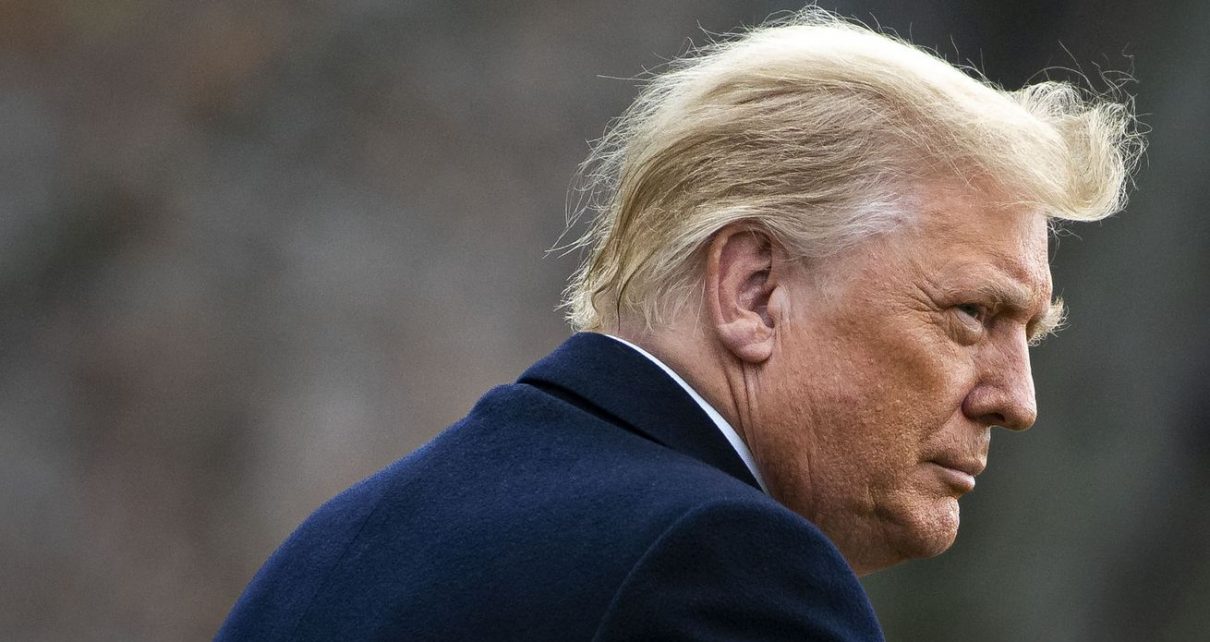
Trump wants to reject a defense bill over keeping US Army bases named after Confederates. No, an internet law. Actually, China.
First, President Donald Trump threatened to veto the annual defense bill because lawmakers wanted the names of Confederate generals removed from US Army bases.
Then, he said he’d torpedo the bipartisan legislation unless it repealed an internet free-speech law, allowing him to spew conspiracy theories on the internet unchallenged. And on Sunday, he pledged to block the bill because it’s not tough enough on China, despite it having what one Democratic Congressional aide described to me as “the strongest provisions ever to address the rising power.”
Despite the jumble of justifications, making Trump look unserious, what he’s promising to do has far-reaching consequences — potentially harming military members, their families, and Trump’s own reputation in the process.
Among many other things, the $741 billion National Defense Authorization Act (NDAA) includes pay raises for US troops, billions for a counter-China fund, and military construction projects that pour money into local economies. Those provisions are why the Republican-controlled Senate and Democrat-led House overwhelmingly passed the bill last week, continuing a decades-long streak of approval.
But Trump wants to kill this version of the NDAA — a bold play, as both chambers okayed the law with veto-proof majorities last week. They’ll be able to override a Trump veto if those margins hold, possibly dealing the president a stinging rebuke as his administration winds down.
It helps explain why Trump is lunging for something — anything — that would get lawmakers to meet his demand to kill the bill. His messaging so far hasn’t gained any traction, perhaps because the main three points he’s making haven’t found a large audience in Congress.
“I don’t think Donald Trump knows what he’s talking about,” said Rep. Jason Crow (D-CO), a House Armed Services Committee member and former Army Ranger.
Still, there’s a small, concerted effort to support the president, even if success seems like a long shot. House Minority Leader Kevin McCarthy (R-CA) said he doesn’t support overriding Trump’s veto, which could convince others to side with him, and Sen. Rand Paul (R-KY) already tried to stop the NDAA over a provision that could delay the withdrawal of troops from Afghanistan.
It’s therefore worth going over the president’s shifting rationales for blocking the authorization bill, and why he keeps changing his main message for why he wants to strike the NDAA down.
Trump’s three very different reasons for threatening to veto the NDAA
As the nation contended with systemic racism after the killing of George Floyd this summer, the US Army opened the door to possibly renaming 10 US Army posts named after Confederate leaders. Lawmakers, namely Sen. Elizabeth Warren (D-MA), thought it was long past time to do so and placed a provision in the NDAA to have the Confederate generals’ names, likenesses, and other Confederate paraphernalia permanently barred from those bases within three years.
Trump has continuously blasted the idea, though, and promised to veto the bill if it included Warren’s provision. Through tweets and official White House statements, the president has argued that renaming the bases would somehow diminish the accomplishment of service members who deployed from there during World War II and other battles.
I will Veto the Defense Authorization Bill if the Elizabeth “Pocahontas” Warren (of all people!) Amendment, which will lead to the renaming (plus other bad things!) of Fort Bragg, Fort Robert E. Lee, and many other Military Bases from which we won Two World Wars, is in the Bill!
— Donald J. Trump (@realDonaldTrump) July 1, 2020
It’s possible Trump truly felt that way, but most experts at the time said the president was trying to rally his base ahead of a tough reelection fight. After all, two of those bases are located in the swing state of Georgia, as well as one each in North Carolina and Texas, which before the November vote many thought might tilt Democratic.
But Trump’s argument didn’t work, and the provision to rename those bases made it into current the version of the NDAA.
Seeing a lack of progress with the Confederate play, Trump tried killing the bill by calling for it to contain a repeal of Section 230, which Recode’s Sara Morrison described as “the legal backbone of the internet” and “the pillar of internet free speech.”
Basically, the 30-year-old law protects internet platforms from liability for many of the things third parties say or do on them. If it were to be repealed, companies like Facebook and Twitter — which proved instrumental in the president’s rise — couldn’t operate as they do now.
But Trump doesn’t like the law because it allows others to criticize him on those platforms, and doesn’t stop those platforms from labeling some of Trump’s statements as misinformation.
As a result, he threatened to veto the NDAA over the issue.
…..Therefore, if the very dangerous & unfair Section 230 is not completely terminated as part of the National Defense Authorization Act (NDAA), I will be forced to unequivocally VETO the Bill when sent to the very beautiful Resolute desk. Take back America NOW. Thank you!
— Donald J. Trump (@realDonaldTrump) December 2, 2020
Trump has received bipartisan support for changes to Section 230, though Democrats and Republicans differ over why and how. The problem for the president is few want to use the NDAA to take up that debate.
“The president knows that I agree with him 100 percent on the need for a full repeal of Section 230,” said Sen. Jim Inhofe (R-OK), chair of the Senate Armed Services Committee (SASC), said in a statement earlier this month. “It’s unfortunate that Members of Congress on both sides of the aisle disagree with the need for a full repeal — but, because of that, it is impossible to add a repeal of Section 230 to the defense authorization bill.”
Congress, then, didn’t cave to Trump’s demands, and the NDAA doesn’t contain a provision to repeal Section 230.
Which explains why Trump is pushing a new main argument now: The defense authorization bill isn’t tough enough on China. It’s unsurprising that the president would play this card, as he knows there’s a bipartisan consensus on the need to confront Beijing.
THE BIGGEST WINNER OF OUR NEW DEFENSE BILL IS CHINA!. I WILL VETO!
— Donald J. Trump (@realDonaldTrump) December 13, 2020
But even this effort probably won’t work, experts say. Eric Sayers, a former Republican staffer on the Senate Armed Services Committee who is now at the American Enterprise Institute, told me “this is the most important and substantive NDAA on China in two decades, so the Trump administration claim that he is vetoing because this is weak on China is bizarre.”
There are many ways the bill is tough on China, but the most prominent is that it establishes a “Pacific Deterrence Initiative.” Funded at $2.2 billion, it’s billed as a new way to ensure the US has the resources available to counter China’s military goals.
“The Pacific Deterrence Initiative will enhance budgetary transparency and oversight, and focus resources on key military capabilities to deter China,” Inhofe and Rhode Island Sen. Jack Reed, the top SASC Democrat, wrote in War on the Rocks in May. “The initiative will also reassure U.S. allies and partners, and send a strong signal to the Chinese Communist Party that the American people are committed to defending U.S. interests in the Indo-Pacific.”
However, some in the president’s orbit say he makes at least one good point on China and the NDAA. There was hope that the bill would include a ban on purchases of Chinese drone technology by federal agencies or with federal funds, but it didn’t make it into the version of the bill that passed both chambers. That made DJI, the world’s largest drone manufacturer, headquartered in China, very happy.
“We are pleased to see that the NDAA conferees took seriously the many concerns voiced by federal agencies, American companies, industry groups, universities and end users — all of which have indicated a country of origin ban would have serious, unintended consequences,” read a statement by the company last week.
For the moment, it appears both the Senate and House have the two-thirds majority necessary to override the president’s potential veto. That’s good news for many, namely service members who could lose out on a 3 percent pay raise if the bill doesn’t become law and defense contractors that would miss out on billions in revenue.
Still, lawmakers like Crow, the House Armed Services Committee Democrat, worry increased pressure from the president and Congressional leaders could change that calculus. “It’s always a concern in this era,” he told me. Many Trump allies prefer “showing more support for the president than fulfilling their independent obligations as members of Congress.”
Crow doesn’t want to see that happen: “We have to be supporting those who are supporting us.”





